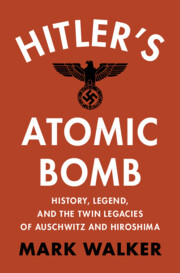Book contents
- Hitler’s Atomic Bomb
- Hitler’s Atomic Bomb
- Copyright page
- Dedication
- Contents
- Figures
- Preface
- Acknowledgments
- Abbreviations
- Introduction
- Part I The Bomb
- 1 Farm Hall
- 2 Nuclear Fission
- 3 Lightning War
- 4 Selling Uranium
- 5 Total War
- 6 The War is Lost
- Part II Living with the Bomb
- Glossary
- Notes
- Archives
- Bibliography
- Index
- Hitler’s Atomic Bomb
- Hitler’s Atomic Bomb
- Copyright page
- Dedication
- Contents
- Figures
- Preface
- Acknowledgments
- Abbreviations
- Introduction
- Part I The Bomb
- 1 Farm Hall
- 2 Nuclear Fission
- 3 Lightning War
- 4 Selling Uranium
- 5 Total War
- 6 The War is Lost
- Part II Living with the Bomb
- Glossary
- Notes
- Archives
- Bibliography
- Index
Summary
In the late 1930s scientists were puzzled by the mysterious behavior of uranium when bombarded by neutrons. Several different research groups were working on these questions, including two German chemists, Otto Hahn and Fritz Strassmann, and an Austrian, “non-Aryan” physicist, Lise Meitner. When Germany absorbed Austria in 1938, Meitner fled to Scandinavia. However, their collaboration continued, culminating in Hahn and Strassmann’s discovery that uranium had been split and, together with her nephew Otto Frisch, Meitner’s theoretical explanation of what came to be called nuclear fission. Scientists in many countries immediately began studying this phenomenon and publishing their results. By the time these publications were stopped by censors or self-censorship, it was clear that one rare isotope of uranium, 235, was easily fissionable, while the common isotope 238 could absorb a neutron and transmute into a fissionable transuranic element. This was the basis for wartime research projects on atomic bombs.
- Type
- Chapter
- Information
- Hitler's Atomic BombHistory, Legend, and the Twin Legacies of Auschwitz and Hiroshima, pp. 13 - 20Publisher: Cambridge University PressPrint publication year: 2024



